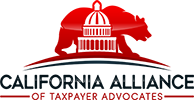What is the California Alliance of Taxpayer Advocates (CATA)?:
The California Alliance of Taxpayer Advocates was formed on May 20, 2011 and is a non-profit trade association made up of tax consultants representing taxpayers before County Assessors, The Franchise Tax Board and The State Board of Equalization. CATA’s purpose is to protect the rights of state and local taxpayers by advancing the professional practice of state and local tax consulting through education, advocacy and high ethical standards.
Why was CATA formed?
CATA was organized to ensure the adherence of high ethical standards by its membership in the property tax consulting profession and to promote sound public policy that protects taxpayers.
What State and Local Public Policy Issues does CATA monitor and engage?
CATA has engaged in a number of public policy issues among them are the following:
- Opposed SB 342 (Wolk). This measure introduced in 2011 sought to among other things, prohibit a person from charging a contingent fee for any matter involving a tax imposed under the Revenue and Taxation Code. This measure failed to pass the house of origin deadline and is dead.
- CATA argued that SB 342 is unnecessary and interferes with access to our justice system for taxpayers, and in particular small businesses and individuals. More importantly the provisions against contingency fees have the unintended consequence of making the administration of appeals far less efficient than it is currently. It would likely encourage fewer settlements and more protracted assessment appeal hearings. Abolishing the contingency fee will not make tax issues go away. If the contingency fee is abolished more uninformed taxpayers will be forced to handle their own appeals. Most property tax agents understand and are experienced with property tax matters. It is known to most assessors that individual taxpayers who do not have a strong background in property tax will require substantial additional county personal time to work through even the most simple tax issues.
- Many employers, especially small businesses, utilize contingency fee arrangements when dealing with tax issues as they do not have the financial resources to pay up-front fees for tax consultants, accountants or attorneys. SB 342 would eliminate financially struggling businesses from being able to pursue and/or defend against unreasonable tax assessments or even legally challenge the validity of newly enacted taxes. Most small and medium companies cannot budget for these types of consulting fees. It is these taxpayers who demand from tax consultants, accountants or attorneys these fee arrangements.
- CATA has worked with various County Assessors and County Assessment Appeals Boards to make the assessment appeals process more efficient for both the county and local taxpayers.
- 2012 has spawned a flood of tax initiatives that proponents are seeking to qualify for the November 6, 2012, General Election. CATA has educated its Members on these measures. There are currently 15 proposed tax initiatives circulated for signatures to get on the ballot. One is of particular interest to CATA Members and our clients. It proposes to require the assessment of most commercial property every three years. Specifically the proposed initiative seeks changes to existing law to require commercial property be assessed at fair market value a least once every three years. It excludes residential and agricultural property. Further, it doubles homeowners’ tax exemption and renters’ credit. It excludes from taxation the first $1 million in tangible personal property. The Legislative Analyst Office and the Director of Finance estimate the fiscal impact to be an annual state revenue increase of about $4 billion from higher property tax assessments on commercial and industrial property. If approved, new revenues will be used in part to increase state funding for schools and community colleges ($2 billion) and provide tax relief to home owners and businesses ($1 billion). They also estimate the annual local government revenue increase of about a 450 million from higher property tax assessments on commercial and industrial property. Approved for circulation on January 23,2012, the proponents have until June 21,2012 to collect 807,615 valid signatures.








